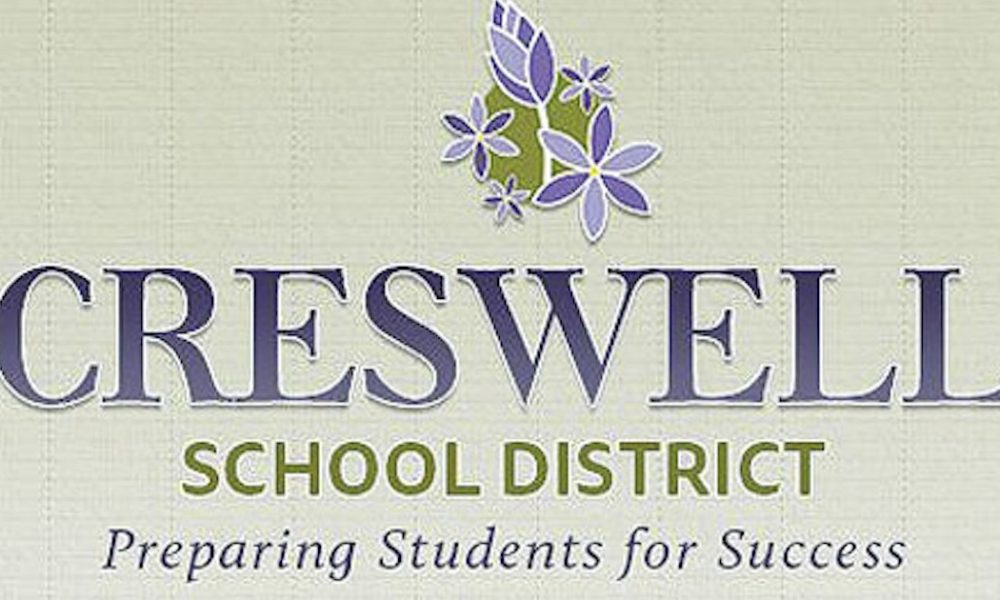
The staff at Creswell Middle School are continuing their own education by forming a book club dedicated to enhancing relationships with their students. This year, the book is ”Emotional Poverty in All Demographics” by Ruby Payne, which explores the best practices and strategies for addressing anger, anxiety and violence in the classroom.
”Kids are coming from all types of places,” Rob Jerome, seventh and eighth grade social studies teacher and school improvement specialist, said. ”The book helps us understand where the kids are coming form and strategies on getting kids to learn.”
The book has helped teach students through the Second Step program, a curriculum of social emotional learning to help kids understand emotions and think through their actions before reacting, Jerome said.
The program started around five years ago, Principal Shirley Burrus said. She said that overall the impact has been ”very positive” and the staff all speaks the same language.
”The staff has been great and it’s helped with a lot of students,” she said. ”It helps us help them.”
As both a teacher and office staff, Jerome said he has seen the book empower him in both areas. In the classroom, it helps him understand and empathize when a student is struggling, and recognize the student’s emotions might be the result of something else and not just a fault of the child.
”One of the things we’re working on is building relationships because research (shows) that its the strongest indicator of student’s success is their relationship with a teacher,” he said.
An example of those that research came from a study done by the University of Texas, where it proved that ”students’ reports of teachers’ attitudes, suggests that students expend more effort (as reported by teachers) when they perceive that teachers care about students.”
He has also witnessed Burrus implementing the strategies with students who are called to the office. If students are agitated, Burrus will give them time alone with a glass of water before meeting, to help the students get to a place where they can talk calmly.
”Sometimes we need to make sure that we’re addressing each students’ needs,” Jerome said. ”You read a book like this and identify things about the student, it helps teachers be able to serve the student in individualized ways.”
Burrus said that in some cases, students can’t all have equal treatment because every student is different; some students need something specialized to them, whether it’s more understanding, calmness or water.
”Something awful might have happened at home last night, and building a relationship (with the student) helps them talk about it,” she said.
Beyond ”Emotional Poverty,” other books the middle school has read in the past few years have also remained beneficial. ”The Growth Mindset Coach: A Teacher’s Month-By-Month Handbook for Empowering Students to Achieve” by Heather Hundley and Annie Brock was read last year, and ”Help for Billy: A Beyond Consequences Approach to Helping Children in the Classroom” was read the year prior.
Jerome said ”The Growth Mindset Coach” taught him how to push back when a kid is encountering difficulties, and that failure isn’t a bad thing but can be a good way to learn new things.
”(The book) had a big impact on the school and staff,” he said.
Although a portion of the elementary school staff has also read ”Help For Billy,” which focuses on children’s trauma, these teacher book clubs have not been implemented at other schools in the district, as it has with the middle school.
”We like like to think that we’re leaders in what we do,” Burrus said.
Jerome said the middle school was already in a position where they were ready for these books, and the staff were open to the book’s messages.
”We have a lot of veteran teachers that are receptive to learning new things,” Jerome said, ”and we have newer teachers with great new ideas that energize us. No matter what book we brought, we have such a great staff that’s receptive to learning.”
Teaching can be an isolating profession at times, Jerome said, and these book clubs have put teachers in contact to share what they’ve learned and the strategies they have implemented.
”(Emotional Poverty) has helped me in so many different individual stories,” Jerome said. He teaches around 100 students a day, and he has become more aware of students’ faces and emotions. He said the leads to a lot more side conversations, where he has learned a lot from the student, as well as tools to be more understanding.
”It’s impacted not just my professional life, but my personal life,” he said. ”Professional development is an important thing that the public doesn’t always see. Teachers work hard at perfecting their craft and it’s an important thing for people to support. Teachers want to continue to learn, and it’s great they have been supported by the district.”








